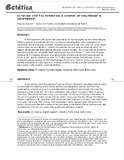| dc.rights.license | http://creativecommons.org/licenses/by-nc-sa/3.0/ve/ | |
| dc.contributor.author | Navia, Mauricio | |
| dc.date.accessioned | 2014-07-25T11:40:59Z | |
| dc.date.available | 2014-07-25T11:40:59Z | |
| dc.date.issued | 2013 | |
| dc.identifier.issn | 1856-1276 | |
| dc.identifier.uri | http://www.saber.ula.ve/handle/123456789/38874 | |
| dc.description.abstract | El desplazamiento del soporte del celuloide por el soporte digital, en esta última década,
obliga a repensar el significado del cine y la cultura cinematográfica. Esta investigación se
sustenta en dos afirmaciones recientes. Spielberg anunció el fin del cine, junto con Lucas, según
publicó la BBC en julio de 2013; y Martin Scorsese dijo en una carta, en enero de 2014: “el
negocio de las películas se encuentran ahora en una encrucijada… por primera vez en la historia
de esta forma de arte, se pueden hacer películas por muy poco dinero…”. Nollywood, la nueva
industria de D-Cineastas africanos lo ha demostrado: produce más de 1200 largometrajes de
ficción al año que se ruedan en 10 días. En 13 años llevan más de 7000 películas. El cine
venezolano apenas alcanza los 200 largometrajes-ficción en su historia. Gochywood (el cine de
Mérida) está dando un salto hacia el D- Cinema iniciando una nueva era de realizaciones de muy
bajos costos y alta calidad y contenido estético. | es_VE |
| dc.language.iso | es | es_VE |
| dc.rights | info:eu-repo/semantics/openAccess | |
| dc.subject | D-cinema | es_VE |
| dc.subject | Formato digital | es_VE |
| dc.subject | Industria | es_VE |
| dc.subject | Nollywood | es_VE |
| dc.subject | Bollywood | es_VE |
| dc.title | El fin del cine y el futuro del D-cinema. De Nollywood a Gochywood. | es_VE |
| dc.type | info:eu-repo/semantics/article | |
| dc.description.abstract1 | In the last ten years the passing of making a film in celluloid to use digital support make
us reconsider the meaning of the cinema and the cinematographic culture. The following
investigation is backed up by two current affirmations. Spielberg’s announced with Lucas the
ending of cinema in the BBC July’s 2013 publication, and a Martin Scorsese’s letter of January
2014 sais: “the movies business is now in a crossroad… for the very first time in the history of
this art it is possible to make movies with low costs”. Nollywood, the new African Film Makers
industry had shown with more than 1200 movies per year produced in 10 days. They have made
in 13 years more than 7000 movies. The Venezuelan cinema reaches hardly 200 films in its
history. Gochywood (Merida’s cinema) is taking a steep in the Digital Cinema starting a new age
of productions with very low costs, high quality and aesthetics contents. | es_VE |
| dc.description.colacion | 57-73 | es_VE |
| dc.description.email | naviamau@ula.ve | es_VE |
| dc.description.frecuencia | semestral | |
| dc.identifier.depositolegal | 199702ME179 | |
| dc.publisher.pais | Venezuela | es_VE |
| dc.subject.centroinvestigacion | Centro de Investigaciones Estéticas (CIE) | |
| dc.subject.facultad | Facultad de Humanidades y Educación | es_VE |
| dc.subject.institucion | Universidad de Los Andes | es_VE |
| dc.subject.keywords | D-cinema | es_VE |
| dc.subject.keywords | Digital support | es_VE |
| dc.subject.keywords | Industry | es_VE |
| dc.subject.keywords | Nollywood | es_VE |
| dc.subject.keywords | Bollywood | es_VE |
| dc.subject.publicacionelectronica | Revista Estética | |
| dc.subject.seccion | Revista Estética: Artículos | es_VE |
| dc.subject.thematiccategory | Artes y Humanidades | es_VE |
| dc.subject.tipo | Revistas | es_VE |
| dc.type.media | Texto | es_VE |


